One of the ways you can keep Alzheimer’s at bay is by adopting a MIND diet. MIND is a short form for Mediterranean DASH Diet Intervention for Neurodegenerative Delay. This study showed that people who followed either of these diets had a 40% lower chance of developing plaques and tangles in their brains.
The findings

Join Now >
Researchers found that people who adhered most to Mediterranean and MIND diets had brains similar to being 18 and 12 years younger than those who adhered less, respectively. Even if someone did not follow this diet wholly and added just one of its ingredients, it “reduced amyloid buildup in the brain to a level similar to being about four years younger”.
One study found that for the people who followed the Mediterranean or MIND diet, the dementia risk was reduced by one-third. Some studies suggest that a Mediterranean diet can reduce the chances of cognitive issues and dementia. There is also proof that this diet lowers the risk of stroke, type 2 diabetes, and cardiovascular diseases and even prevents bone loss. Considering all these are risk factors for dementia, it makes sense.
What is the MIND diet?
It is a hybrid offshoot of the two popular diets, the Mediterranean and DASH (Dietary Approaches to Stop Hypertension). The intent was to uplevel it for brain health. For example, unlike the Mediterranean diet, which provides an umbrella of food choices, the MIND diet recommends specific amounts of foods that help improve brain health.
Scientific evidence suggests that dark leafy greens provide the maximum benefit, with the brains of people who ate the most greens looking 19 years younger in plaque buildup. Hence, the MIND diet urges you to eat it daily. You could pick from mustard greens, spinach (palak), radish greens, and other regulars. The second-best food to include is berries, such as strawberries, blackberries, etc. Did you know that your diet not only results in being healthy but can also alleviate stress?
What is the Mediterranean diet?
As part of this diet, people mostly eat plant-based foods. A large portion of most meals must include fruits, vegetables, whole grains, beans, seeds, nuts, etc. It also includes eliminating the use of oils other than extra-virgin olive oil. The same goes for butter, sweets and refined sugar or flour.
This diet uses meat rarely, but eggs, dairy and poultry in smaller portions are allowed. It is okay to eat fish as they contain Omega-3, which boosts brain health.
How do these diets help lower the risk of Alzheimer’s?
The leafy greens contain bioactive compounds such as Vitamins, minerals, antioxidants (Flavonoids), and Lutein (carotenoids). All these are good for our brain health. There seemed to be a remarkably positive impact on the beta-amyloid buildup and tau tangles, two markers of Alzheimer’s disease.
High antioxidant levels from fruits and vegetables may help protect against Alzheimer’s disease-related damage to brain cells. Also, antioxidants enhance levels of proteins that help protect the brain cells from damage. Lutein protects against oxidative stress and inflammation, another deterrent to Alzheimer’s disease.
Additionally, the findings mentioned above are add-ons to why this diet might help reduce the risk of dementia. So, what can you do?
Time to change your eating habits
If you are not a hard-core non-vegetarian, following the MIND/Mediterranean diet is not difficult. Increase eating plant-based foods, whole grains, beans, etc., and reduce meat and dairy products. Most Indians do eat plant-based foods regularly. Hence, it may be a question of making conscious choices. But if the diet choices can reduce the chances of a grave disease like Alzheimer’s, it is worth a shot. Because this disease still has no one known cause or cure.










